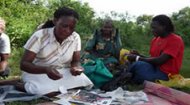Advice for a Volunteer in Uganda
Embarking on a volunteer journey in Uganda is an adventure, and preparation is key to a rewarding experience. Here's some useful advice:
Visa: Obtain the necessary Ugandan visa well in advance. This can be done online before departure.
Vaccinations: Consult your doctor about required and recommended vaccinations (e.g., Yellow Fever, Typhoid, Hepatitis A&B, Tetanus, Rabies) and malaria prophylaxis.
Insurance: Secure comprehensive travel and medical insurance that covers emergency evacuation.
Packing: Pack light but include essentials like insect repellent, a first-aid kit, modest clothing suitable for local customs and hot weather, sturdy shoes, and a refillable water bottle.
Cultural Sensitivity and Open-mindedness: Respect Local customs and dress modestly, especially in rural areas and when visiting religious sites. Politeness and respect are highly valued.
Learn Basic Phrases: Even a few words of Luganda (e.g., "Jambo" - hello, "Webale" - thank you) can go a long way in building rapport. Runyankole is spoken in the south of the county. Check out The Western Uganda Network has some useful expressions and a FREE downloadable dictionary here.
Observe and Listen: Take time to understand local perspectives, work styles, and cultural nuances before jumping in with solutions.
Be Patient and Flexible: "African time" is a real concept. Things may not always run on schedule, and plans can change unexpectedly. Embrace flexibility and patience.
Ethical Volunteering: Avoid "Voluntourism" Pitfalls: Ensure your work genuinely helps and doesn't displace local workers or create dependency. Be critical of projects, especially those involving orphanages, and prioritise programs that support family reunification or community-based child care.
Sustainable Impact: Focus on imparting skills and knowledge that empower locals to continue the work after you leave, rather than just completing tasks.
Manage Expectations: You are a volunteer, not a savior. Your role is to support and contribute to existing efforts.
Health and Safety: Drink only bottled or filtered water. Be cautious with street food and ensure cooked meals are hot. Be aware of your surroundings, especially in urban areas. Avoid walking alone at night. Keep valuables secure and out of sight. Trust your instincts. Follow local news and advice from your host organisation.
Budget Wisely: Account for program fees, flights, visa costs, insurance, local transport, food, and personal spending money. The Ugandan Shilling (UGX) is the local currency. ATMs are available in major towns, but cash is often preferred in rural areas.
If you are considering undertaking a period of volunteer work in Uganda check out our Uganda profile page to explore the country before you visit and learn how to make the most of your volunteer work in Uganda. Also have a read of the Lighthouse Project below, a humourous and insightful tale about being a volunteer in Uganda. |























